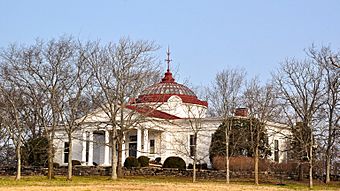Knights of Pythias Pavilion facts for kids
Quick facts for kids |
|
|
Knights of Pythias Pavilion
|
|

Knights of Pythias Pavilion, March 2014.
|
|
| Location | TN 96, Franklin, Tennessee |
|---|---|
| Area | 3.7 acres (1.5 ha) |
| Built | 1897 |
| Architect | Gibel, Henry |
| Architectural style | Classical Revival |
| MPS | Williamson County MRA |
| NRHP reference No. | 88000292 |
| Added to NRHP | April 14, 1988 |
The Knights of Pythias Pavilion in Franklin, Tennessee, is also known as Carlisle House. It is a beautiful building designed by Henry Gibel. The pavilion was built in 1897. It shows off a style called Classical Revival architecture. In 1988, this special building was added to the National Register of Historic Places. This list helps protect important historical sites.
What Makes the Knights of Pythias Pavilion Special?
The Knights of Pythias Pavilion is a very unique building. It stands out because of its interesting history and design. It was not always in Franklin, Tennessee. This building has a story of travel and new beginnings.
A Building on the Move: Its Early History
The Knights of Pythias Pavilion started its life in a different city. It was first built in Nashville, Tennessee, for a big event. This event was the Tennessee Centennial Exposition in 1897. A "centennial exposition" is a large fair that celebrates 100 years of something important.
After the fair ended, the pavilion was bought. It was then carefully moved by wagons. This journey took it all the way to its current spot. It now sits on a hill west of Franklin, off Highway 96. Imagine moving a whole building!
Unique Design and Features of the Pavilion
The pavilion has a special look. It is built in the Neo-Classical style, which means it uses ideas from ancient Greek and Roman buildings. One of its most striking features is a large, round, red dome on top. This dome makes the building easy to spot.
The house also has details from the Colonial Revival style. This style brings back popular designs from early American homes. The Knights of Pythias Pavilion has not been changed much over the years. This means it still looks very much like it did when it was first built. It is truly one of the most unusual and important designs in the area.



